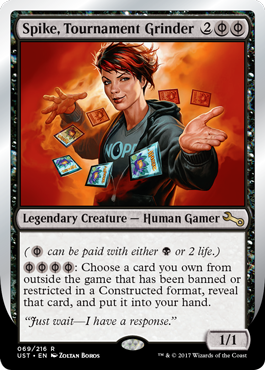
Spike is here, and she is AMAZING! With the release of Unstable just around the corner, there is perhaps no single card I was more excited to see than Spike, Tournament Grinder.
While I am a bit disappointed that my prediction of Spike getting her spark did not come true, it makes more sense that Spike completes the cycle started in Unglued—in a properly spikey manner. Like Timmy, Power Gamer and Johnny, Combo Player before her, Spike is a 4-mana 1/1 with a game-breaking activated ability. In Spike’s case, however, her colored mana symbols and activated ability cost have been appropriately replaced with Phyrexian mana (read: the most broken mana).
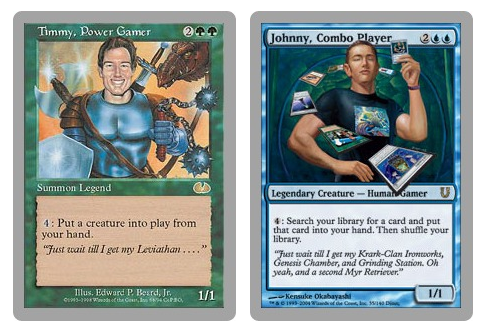
Timmy and Johnny may be powerful, but Spike is straight-up busted. For the uninitiated, Timmy, Johnny and Spike represent the three basic types of Magic: the Gathering players as described by Magic R&D. For a deeper understanding of what these terms mean, read “Timmy, Johnny, and Spike” (Mark Rosewater, 2002). For a basic understanding of Spike:
Spike is the competitive player. Spike plays to win. Spike enjoys winning. To accomplish this, Spike will play whatever the best deck is. (…) Spike enjoys the stimulation of outplaying the opponent and the glory of victory.
Spike cares more about the quantity of wins than the quality.
Unlike Timmy and Johnny, Spike, Tournament Grinder is not limited by the cards in your deck. Instead, she may Wish for any card you own that has ever been banned or restricted in a Constructed format. Commander, Block, T2, Vintage, Legacy, Standard, Pauper, you name it; if it’s been banned or restricted in an officially sanctioned Constructed format, Spike can get it for four black mana, 8 life or something inbetween.
With access to so many cards, you may find yourself at a loss as to what you might reasonably grab. There are a lot of choices, and many of them are incredibly expensive. I am not sure you should expect to see many players activating her ability to grab Ancestral Recall. That’s unreasonable (though I’m sure it will happen at some point).
But that shouldn’t mean you need to pass her by when that Unstable draft comes along. Rather than shy away from this amazing card, with a little preparation, you can be ready to completely break the game. If you’re lucky enough to open Spike, Tournament Grinder, that is. You may even already own some of these cards!
Top 13-ish Spike Targets
Before we hop into this highly-scientific list, I want to explain myself. This is not necessarily meant to be the absolute best cards to Wish for with Spike, but rather the best cards that are reasonably attainable for your Unstable draft events. The financial cost was heavily weighted in my decision and ranking for that reason—few are likely to buy Black Lotus, Time Vault or Shahrazad for a goof.
Due to her Phyrexian mana, you can technically play Spike in any Unstable build. However, the high life cost to activate her ability without black mana means she is most reasonable in a black deck. For that reason, I have also given greater consideration to cards that may be easier to utilize within Unstable draft archetypes. That means you won’t see off-color gold cards like Reflector Mage on the list.
Finally, while many of the cards below are powerful or just plain fun, I have also tried to include some pieces that can provide great utility benefits in a draft environment. These picks may be closer to “fair” in a silly Un-draft, but you won’t regret the option to use Spike, Tournament Grinder as a near-bottomless toolkit.
13. Once More with Feeling
UPDATE: Thanks to user Philip_J_Frylock over on reddit for pointing out that silver-bordered cards cannot be used with Spike since they are never Constructed legal to begin with.
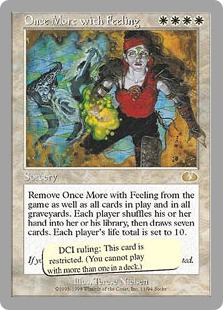
Once More with Feeling deserves a spot on my list if only for the fact that it is the only card to receive a DCI restriction as part of the official rules text. It’s only fair to bring your Unstable draft full circle with an original Unglued card in your banned and restricted arsenal.
I don’t think it’s entirely unplayable, either. The price tag on Shahrazad is frankly insane, so Once More with Feeling creates a worthy approximation in that it resets the game in a pinch. Admittedly, four white mana will be difficult to cast, which puts this at the bottom of my list.
12. Lingering Souls
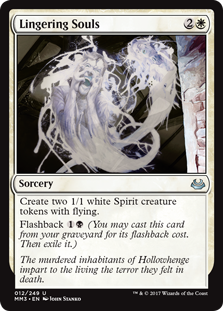
You can thank Innistrad Block Constructed for the ability to search for Lingering Souls. This token generating sorcery has been a hit in just about every format where it’s legal, and it sees a good amount of Modern play to this day. It may not be the flashiest choice, but getting four 1/1 flying tokens for five mana should help close the game out in a jiffy.
Among all of the cards on this list, Lingering Souls is most certainly the easiest to attain. Dig through your uncommons before heading to your LGS for Unstable draft night!
11. Necropotence
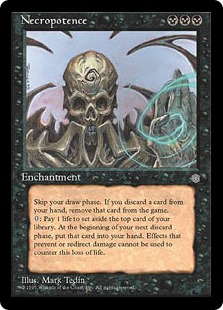
What can I really say about Necropotence that hasn’t already been said? It is perhaps one of the most best black cards ever printed, allowing you to mainline cards in exchange for life. Necropotence was an original sleeper hit. Initially overlooked, players eventually learned that resolving this 3-mana enchantment often meant burying your opponent in so much card advantage that life totals no longer mattered.
10. Dark Ritual
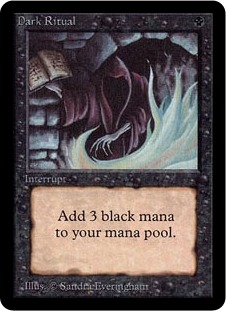
Dark Ritual is the first card on my list to serve a purely utilitarian purpose. At first, it may seem supremely underwhelming. I would argue, however, that Dark Ritual gives you excellent flexibility to bank mana.
Find yourself stuck on four lands? Or maybe you’re under no pressure to Wish for that game-breaking tool just yet? Spend your four mana at end of turn to grab a Dark Ritual for use next turn. With a Ritual or two at the ready, you’ll never waste that extra open mana.
9. The Mirrodin Artifact Lands
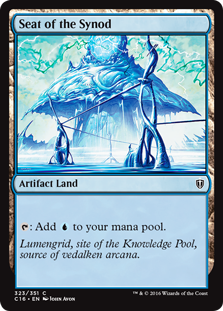
Wizards of the Coast learned the hard way that adding the artifact supertype to lands is maybe not the best idea. When Mirrodin was introduced to the world, the combination of Affinity and cards that care about the artifact supertype quickly broke Standard. In one of the biggest single bannings in Constructed history, Ancient Den, Seat of the Synod, Vault of Whispers, Great Furnace, Tree of Tales and more were all given the axe.
It may have been an upset at the time, but the Mirrodin-era Standard bannings mean your Spike, Tournament Grinder is allowed to snag you whatever mana fixing you need! Mono-black five-color good stuff here we come…? At any rate, carry a couple of these bad boys around, and you’ll be able to cast any banned or restricted card you’d like.
8. Grindstone + Painter’s Servant
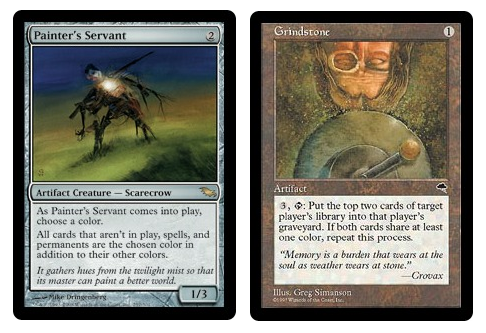
With access to so many incredible cards, I thought it only appropriate to include at least one game-winning combo. If you’re unfamiliar with this interaction, Grindstone mills your opponent for two cards, and if those cards share a color, you repeat the process. Painter’s Servant ensures that all cards share a color, thus milling the opponent’s entire library in a single activation.
This combo works particularly well, because both pieces are colorless, meaning you can technically pull off the win regardless of your deck’s color combination. The total cost to cast and activate this combo is only six mana, meaning it’s entirely possible to end the game within a turn or so of casting Spike.
7. Hurkyl’s Recall
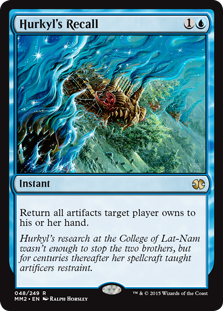
Unstable is an artifact-heavy set where players will be activating Contraptions left and right. Contraptions are an artifact type so special that they don’t even use the standard Magic card back! We want to make sure Spike can lend a hand if our opponent’s sprockets get out of control.
Here’s the interesting thing about Contraptions: According to the Unstable FAQAWASLFAQPAFTIDAWABIAJTBT, Contraptions are permanents on the battlefield once they are assembled, but they don’t exactly follow the same rules as other artifact cards. So what happens if you cast Hurkyl’s Recall? Well, if a Contraption would be placed onto the battlefield and it wasn’t assembled, or if a Contraption would move from the battlefield to any other zone, it is instead placed into its owner’s scrapyard (a special graveyard for the Contraption deck).
In effect, Hurkyl’s Recall reads: “Destroy all Contraptions target player owns.” In the right matchup, that’s devastating, but even hitting 2-3 Contraptions is well worth the mana.
6. Cranial Plating
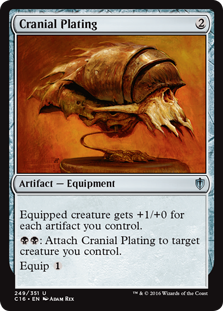
Now, let’s flip the script and look at one of the best options for taking advantage of our own Contraptions. Cranial Plating was great when originally released in Fifth Dawn, and the ability to attach at instant speed keeps it relevant today.
A massive power boost without evasion is often underwhelming. Cranial Plating, circumvents this drawback by just attaching to any creature that goes unblocked. Alternately, it can give you the reins to decide where trades happen, both on offense and defense. It doesn’t take many Contraptions (and don’t forget the Plating itself) to make combat difficult for your opponent while chipping in for lots of damage.
5. Balance

It’s at this point in the list that we get to some of the more heinous cards you can Wish for with Spike, Tournament Grinder (while staying within a reasonable budget). If Spike is in your opening hand, make your second land drop and sit back as long as you can while your opponent plays out their hand and assembles their Contraptions. Then, once they’ve overextended—likely assuming you’re short on mana—cast Spike, followed by Balance.
Sure, this may be Magical Christmas Land, but ’tis the season! If your opponent can curve out without setting you too far behind, a well-timed Balance will completely decimate them. Wishful thinking aside, Balance can swing the game around in your favorite in a lot of situations. And you can currently acquire a copy for as low as $1-2!
4. Recurring Nightmare
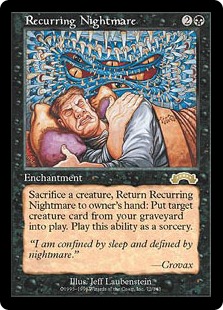
How would you like a reusable reanimation spell that’s nearly impossible to deal with if it resolves? That’s Recurring Nightmare in a nutshell. Count yourself lucky if you’ve never been on the receiving end of this enchantment. If you do not have a way to counter it, keep your opponent’s board clear or their graveyard empty, you will never get rid of Recurring Nightmare.
If you get to resolve Recurring Nightmare, hold priority, and activate its ability. Since returning the Nightmare to your hand is part of the activation cost, there is no opportunity for your opponent to destroy it. Even if they exile its target or Stifle the ability, you will still have Recurring Nightmare in your hand, ready to try again. Keep your best creatures on the battlefield late into the game by trading up any other creature you can stick.
3. Skullclamp
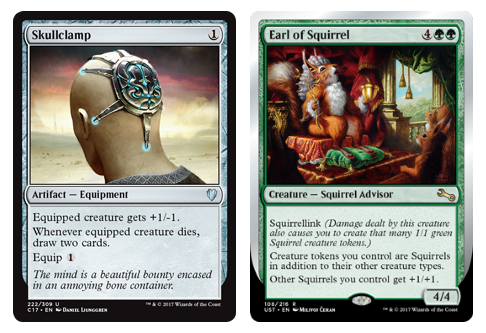
It’s well known that Wizards of the Coast made some mistakes back in Mirrodin block days. With the introduction of equipment and artifact lands, it should be little surprise how many cards from that era made the list. Skullclamp is particularly famous for the seemingly-innocuous change during development from granting +1/+2 to +1/-1, while also reducing the Equip cost to a single mana.
One of the best card drawing engines of all time was accidentally created, and the rest is history. As if Skullclamp wasn’t a good enough addition to just about any limited deck, Unstable introduces the new keyword ability squirrellink.
What is squirrellink? I’ll refer you once again to the Unstable FAQAWASLFAQPAFTIDAWABIAJTBT:
You know how lifelink causes you to gain life? Squirrellink causes you to gain Squirrels.
Admittedly, Earl of Squirrel being a squirrel lord is a bit of a non-bo, but chances are he’ll get eliminated quickly, leaving behind a bevy of Clamp-able targets. If not, you might just want to have Spike grab a copy of Bitterblossom while she’s at it.
2. Mind Twist
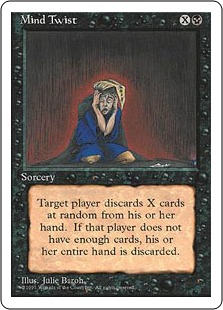
As much as I love it, I think it’s safe to say that Mind Twist is not a “fair” Magic card. It’s not particularly fun, but it may be one of the most bang-for-your-buck options on the list. Cast Spike on Turn 3 or 4, activate her ability to grab Mind Twist at the end of the opponent’s turn, and and watch all hope drain from their face as you put them in top-deck mode before the game has really even started.
Later in the game, Mind Twist will likely not be as good as in the scenario described above, but since few other formats allow it, you can certainly acquire Mind Twist on the cheap. I might recommend you avoid casting this card if you want to retain friends… but it doesn’t hurt to have a copy at the ready. Just in case.
1. Umezawa’s Jitte
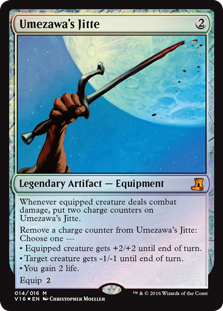
Umezawa’s Jitte is a fundamentally broken and unfair Magic card. Unlike Skullclamp, this was not a mistake. Rather, it’s a prime example of how Wizards tends to push new card types and mechanics early in an effort to encourage players to try them out while also seeking the tipping point between “unplayable” and “too good.” This is the same principle that lead to the creation of ban-worthy cards like Smuggler’s Copter. (Hey, there’s another card for Spike!) Over-the-top cards like this are the reason few new equipment cards ever dominate their formats—Wizards has found a clear example of “too good.”
This is a card that can dominate just about any format you stick it in, and new players often underestimate its power. There are three key factors to the effectiveness of Umezawa’s Jitte:
- The equipped creature needs only deal combat damage. Nowadays, you would expect this ability to require dealing combat damage to a player specifically, but Umezawa’s Jitte triggers from any combat damage. Your opponent cannot simply block the creature to avoid its effect.
- The charge counters generated with its triggered ability are placed on the equipment, not the creature. You can save charges across multiple creatures, or use the ability without a creature at all.
- Dealing damage once allows you to win most combat situations with the equipped creature until your opponent can destroy the equipment itself. With two counters, Umezawa’s Jitte can give the equipped creature up to +4/+4 or pick off smaller creatures with its -1/-1 ability. Both abilities will likely save your creature to fight again and restock counters on the Jitte.
To add insult to injury, if your opponent ever does find a way to deal with Umezawa’s Jitte, you get to cash in any remaining counters for 2 life a piece.
“Just wait—I have a response…”
These are the 13-or-so banned and restricted cards I’ll be stashing away for Unstable drafts in the coming weeks. What did I miss? What cards will you be Wishing for when you crack Spike, Tournament Grinder? I’d love to hear your picks, as well as how they might change for Un-Constructed in the comments below or over at Twitter!
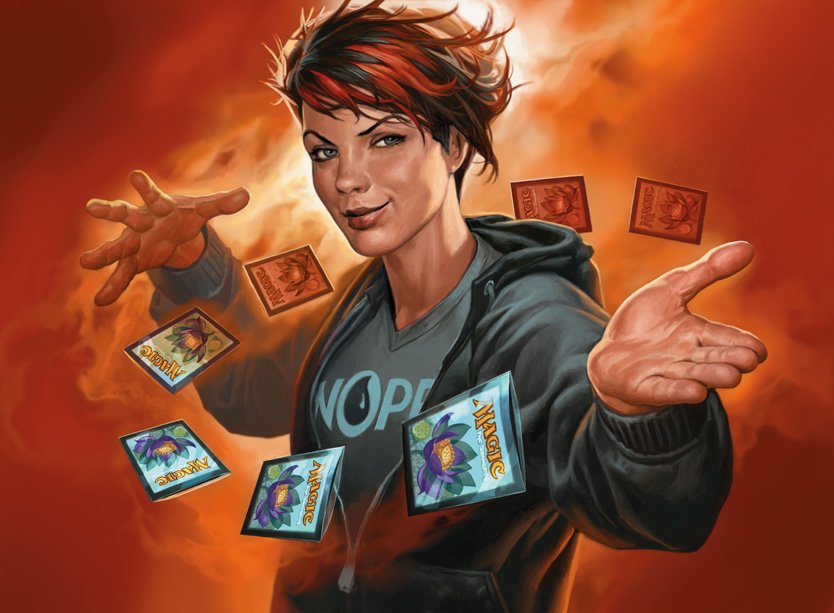
Spike, Tournament Grinder by Zoltan Boros
For complete lists of banned and restricted cards, check out these threads on MTG Salvation and Reddit.